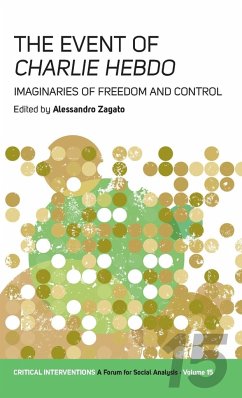The January 2015 shooting at the headquarters of satirical magazine Charlie Hebdo in Paris and the subsequent attacks that took place in the Île-de-France region were staggeringly violent events. They sparked an enormous discussion among citizens and intellectuals from around Europe and beyond. By analyzing the effects the attacks have had in various spheres of social life, including the political, ideology, collective imaginaries, the media, and education, this collection of essays aims to serve as a contribution as well as a critical response to that discussion. The volume observes that the events being attributed to Charlie Hebdo go beyond sensationalist reports of the mainstream media, transcend the spatial confines of nation states, and lend themselves to an ever-expanding number of mutating discursive formations.
Hinweis: Dieser Artikel kann nur an eine deutsche Lieferadresse ausgeliefert werden.
Hinweis: Dieser Artikel kann nur an eine deutsche Lieferadresse ausgeliefert werden.








